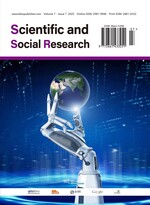Abstract
In the wave of digitalization, artificial intelligence (AI) technology has become the core driving force for corporate innovation, while Generation Z employees (born after 1990) are gradually becoming the mainstay of the workforce. Their pursuit of innovation and sense of responsibility have attracted significant attention. Based on journal studies from the past five years, this paper analyzes the antecedents and influence mechanisms of AI technology application on the responsible innovation of Generation Z employees, drawing on theories such as the social cognitive theory and technology acceptance model. At the organizational level, the depth of enterprise digital transformation strategies and innovation climate has significant impacts. At the individual level, digital literacy and creative self-efficacy play key roles. Existing research has deficiencies in theory, methodology, and practical application, calling for future studies to construct dynamic models, strengthen cross-industry research, and explore ethical collaboration mechanisms.
References
Nazir S, 2023, Exploring the Influence of Artificial Intelligence Technology on Consumer Repurchase Intention: The Mediation and Moderation Approach. Technology in Society, 2023(72): 102190.
Niu L, Yang Z, 2022, Impact of Performance Climate on Overtime Behaviors of New Generation Employees: The Moderating Effect of Perceived Employability and Mediating Role of Job Insecurity. Psychology Research and Behavior Management, 2022(15): 3733–3749.
Burget M, Bardone E, Pedaste M, 2017, Definitions and Conceptual Dimensions of Responsible Research and Innovation: A Literature Review. Science and Engineering Ethics, 2017(23): 1–19.
Middleton L, Hall H, Raeside R, 2019, Applications and Applicability of Social Cognitive Theory in Information Science Research. Journal of Librarianship and Information Science, 51(4): 927–937.
Sagnier C, Loup-Escande E, Lourdeaux D, et al., 2020, User Acceptance of Virtual Reality: An Extended Technology Acceptance Model. International Journal of Human–Computer Interaction, 36(11): 993–1007.
Dearing JW, Cox JG, 2018, Diffusion of Innovations Theory, Principles, and Practice. Health Affairs, 37(2): 183–190.
Aldoseri A, Al-Khalifa KN, Hamouda AM, 2024, AI-powered Innovation in Digital Transformation: Key Pillars and Industry Impact. Sustainability, 16(5): 1790.
Shao C, Nah S, Makady H, et al., 2025, Understanding User Attitudes towards AI-enabled Technologies: An Integrated Model of Self-Efficacy, TAM, and AI Ethics. International Journal of Human–Computer Interaction, 41(5): 3053–3065.
Chen P, Kim SK, 2023, The Impact of Digital Transformation on Innovation Performance: The Mediating Role of Innovation Factors. Heliyon, 2023(9): 3.
Mikalef P, Gupta M, 2021, Artificial Intelligence Capability: Conceptualization, Measurement Calibration, and Empirical Study on its Impact on Organizational Creativity and Firm Performance. Information & Management, 58(3): 103434.
Cetindamar D, Kitto K, Wu M, et al., 2022, Explicating AI Literacy of Employees at Digital Workplaces. IEEE Transactions on Engineering Management, 2022(71): 810–823.
Yumi Y, 2022, New Paradigm and Literacy in the Digital Era: Focusing on Digital Literacy and AI Literacy. The Journal of General Education, 2022(20): 35–60.
Haefner N, Wincent J, Parida V, et al., 2021, Artificial Intelligence and Innovation Management: A Review, Framework, and Research Agenda. Technological Forecasting and Social Change, 2021(162): 120392.
Giering O, Kirchner S, 2021, Artificial intelligence in the Workplace: State of Research, Concepts and Empirical Evidence Regarding Autonomy. Soziale Welt: Zeitschrift Fur Sozialwissenschaftliche Forschung und Praxis, 72(4): 551–588.
